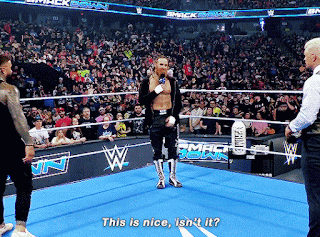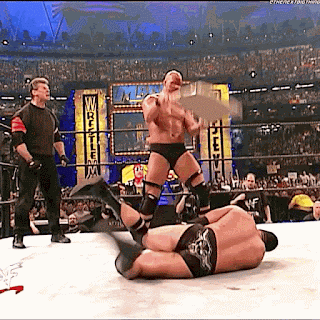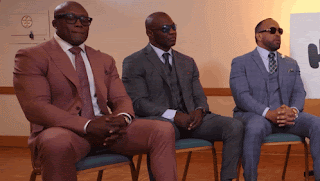
Jun 26, 2025
Wrasslin' Country Reaction Gifs #93

May 22, 2025
Sinners Country Reaction Gifs

May 16, 2025
May 15, 2025
The White Lotus Country Reaction Gifs
May 14, 2025
Fair Trade?
May 13, 2025
Still More Tuesday Memes: Brooks & Dunn, Zach Bryan, Willie Nelson
Mar 12, 2025
John Moreland / "Gentle Violence" / Western AF
Jan 10, 2025
Farce the Music's Top 30 Albums of 2024
Futurebirds’ mix of rock, indie folk, and Americana is right in my wheelhouse. Easy Company is the most accessible album they’ve released, but they didn’t sacrifice any of the song craft or heart to reach this point. Across 12 tracks, 4 each written by the 3 lead songwriters/vocalists, they run the gambit from upbeat country rockers like “It’s Alright” to the optimistic sadness of mid-tempo ballad “Bloom.” For every despairing lament there’s an elbow in the ribs of a line like “I settled on the party like a cold wet rag.” Futurebirds are hard to categorize, but their warmth and absurdly catchy hooks should appeal to a broad array of people who haven’t heard them yet. And despite the word “indie” appearing in the first sentence, there’s no pretentiousness or inscrutable lyrics; these guys’ tunes are full of story-telling, humor, hope, prose, and purpose. Easy Company is easy to digest but hard to escape once the melodies are stuck in your head.
Sometimes, the viral sensation proves worthy of the hype. Of course we all knew about The Red Clay Strays before they blew up on TikTok the past few years, but no gates shall be kept; y’all come on in. There’s a weight to these songs on Made By These Moments. Everything feels important and timeless. You’re gonna get that when the band touches on so many classic sounds. Yeah, you’re going to hear some Johnny Cash, or Otis, or some southern rock, but The Strays have pulled all these influences into a modern sound that is undeniably their own. This is sweaty, passionate music for the feeling AND thinking soul.
The Droptines are bringing back alt-country with a vengeance on their self-titled debut full length album. These songs are full of piss and fire lyrically, but there’s a lot of space in the music, and a sense of longing no matter the tune’s subject matter. “Bill of Sale” is a bastard son of Johnny Cash and early Son Volt with a little lonesome western flair. “Hyna” gives us some loose balladry with bawdy language and burning desire for a woman south of the border. It’s only two verses and a spoken outtro from said woman, giving it an unfinished quality, but that’s kind of the point. This is an impressive first effort, and I honestly expect a future masterpiece from these guys, considering how fully realized they already are.
Honorable Mentions
Sarah Jarosz - Polaroid Lovers
Josh Morningstar - s/t
Kimmi Bitter - Old School
Lost Dog Street Band - Survived
Josh Meloy - Where You Came From
Karen Jonas - The Rise and Fall of American Kitsch
Blackberry Smoke - Be Right Here
Kelsey Waldon - There’s Always a Song
Old Heavy Hands - Small Fires
Tony Martinez - Everywhere West
Miranda Lambert - Postcards From Texas
JP Harris - JP Harris is a Trash Fire
Colby Acuff - American Son
Swamp Dogg - Blackgrass
Red Shahan - Loose Funky Texas Junky
Willi Carlisle - Critterland
India Ramey - Baptized by the Blaze
Caleb Caudle - Sweet Critters
Kim Richey - Every New Beginning
The Secret Sisters - Mind, Man, Medicine
Rob Leines - Headcase
Bronwyn Keith-Hynes - I Built a World
Reckless Kelly - The Last Frontier
Blaine Bailey - Home
Stephanie Lambring - Good Mother
Rich O’Toole - Ghost
Amigo the Devil - Yours Until the War is Over
Cody Jinks - Change the Game
Leon Majcen - s/t
Katie Pruitt - Mantras
Kacey Musgraves - Deeper Well
The Montvales - Born Strangers
Lizzie No - Halfsies
Ellis Bullard - Honky Tonk Ain’t Noise Pollution
Willie Nelson - The Border
JJ Grey & Mofro - Olustee
Kim Richey - Every New Beginning
Sam Morrow - On the Ride Here
Jordan Lee King - By and By
Casper McWade - Something for the Pain
And probably some more that slipped my mind
Favorite Non-Country/Americana Albums
1. MJ Lenderman - Manning Fireworks
2. The Cure - Songs of a Lost World
3. Pearl Jam - Dark Matter
4. Schoolboy Q - Blue Lips
5. Pallbearer - Mind Burns Alive
6. Kendrick Lamar - GNX
7. High on Fire - Cometh the Storm
8. Killer Mike & The Mighty Midnight Revival - Songs for Sinners & Saints
9. Ab-Soul - Soul Bounce
10. Judas Priest - Invincible Shield
11. The Black Crowes - Happiness Bastards







































































